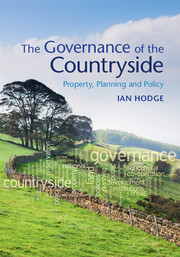Book contents
- Frontmatter
- Contents
- Preface
- Acknowledgements
- List of abbreviations
- Part I Introduction
- Part II Historical models
- Part III Governance under sectoral policies
- 6 Agricultural policies, farming and the environment
- 7 Land, development and planning
- 8 Protected Areas: the example of National Parks
- 9 Wildlife conservation: National Nature Reserves, Sites of Special Scientific Interest and Large-scale Conservation Areas
- 10 Public rights of way and access to the countryside
- 11 The control of agricultural pollution
- 12 The development of agri-environment policy
- Part IV Alternative approaches to governance
- Part V Conclusions
- References
- Index
11 - The control of agricultural pollution
from Part III - Governance under sectoral policies
Published online by Cambridge University Press: 05 February 2016
- Frontmatter
- Contents
- Preface
- Acknowledgements
- List of abbreviations
- Part I Introduction
- Part II Historical models
- Part III Governance under sectoral policies
- 6 Agricultural policies, farming and the environment
- 7 Land, development and planning
- 8 Protected Areas: the example of National Parks
- 9 Wildlife conservation: National Nature Reserves, Sites of Special Scientific Interest and Large-scale Conservation Areas
- 10 Public rights of way and access to the countryside
- 11 The control of agricultural pollution
- 12 The development of agri-environment policy
- Part IV Alternative approaches to governance
- Part V Conclusions
- References
- Index
Summary
A major achievement of the contemporary environmental movement, we would argue, has been to establish an abstracted conception of pollution as wrongdoing. It has thereby elevated pollution and industrial risks to the status of a crime, and forged a new environmental morality.
Philip Lowe, Judy Clark, Susanne Seymour and Neil Ward, Moralizing the Environment: Countryside Change, Farming and Pollution. UCL Press, London, 1997, p. 192Agricultural production can have a variety of impacts on the environment. This chapter concentrates on ‘pollution’ or the negative impacts. However, first we should ask: what is ‘pollution’? The standard answer might be that it is a ‘substance which causes an undesirable change in the physical, chemical or biological characteristics of the natural environment’ (Mayhew, 1997), but it clearly isn't always a specific substance; soil when in fields is a valuable resource, but when washed into rivers as sediment, it becomes a pollutant. Indeed, pollution isn't necessarily a ‘substance’ at all, as even in the context of the definition cited examples are given of noise and heat. This definition also includes natural events, such as a volcano, but more usually it would be an effect that arises from human activity. The key lies in terms of an undesirable effect; an impact of one agent's activity that is in some way harmful to another.
11.1 The characterisation of pollution
An economic definition of pollution as a major class of external cost was discussed in Chapter 2, but we need to be cautious in adopting this definition. The designation of an impact as an external cost of A's activity on B lays clear responsibility on A, but in the absence of B, there would be no external cost and so perhaps B should take responsibility too? Schmid (2004) argues that we should concentrate on interdependencies not externalities. If the lessons given by a music teacher in a house next door to a library cause a disturbance to the readers in the library, there is an interdependency that would not arise if the library were elsewhere. Whether we term this an ‘external cost’ depends on our judgement as to whether the music teacher has a right to teach or whether the readers have a right to read in quiet.
- Type
- Chapter
- Information
- The Governance of the CountrysideProperty, Planning and Policy, pp. 214 - 236Publisher: Cambridge University PressPrint publication year: 2016

